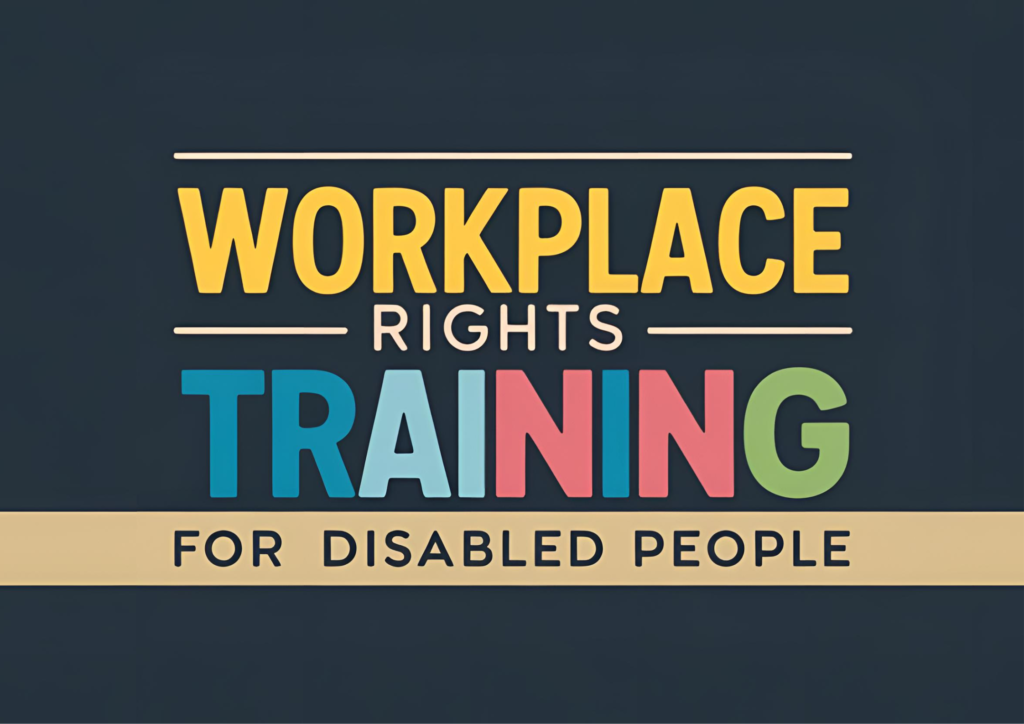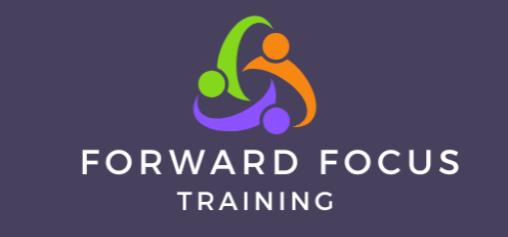No products in the cart.
Workplace Rights Training for Disabled People
Know your rights. Get your needs met. Thrive at work.
Too many disabled people face barriers at work that aren’t about skills or ambition. The problem is often a lack of confidence, unclear information about legal rights, or fear of asking for what’s needed. This training is here to change that.
Workplace Rights Training for Disabled People focuses on practical knowledge and self-advocacy. Participants will learn how to understand their rights under the Equality Act, ask for adjustments, plan a return to work, and build the confidence to communicate their needs clearly.
Whether you’re applying for a job, starting a new role, or managing a health condition at work, these sessions offer practical tools to help you succeed.
Ideal for community organisations, employability programmes, and support services, the training is delivered in a safe, inclusive, and strengths-based environment.

You can’t use the rights you don’t know you have — we’re here to change that
Why Workplace Rights Training Matters
Many disabled people don’t know what support they’re entitled to at work
Legal rights like reasonable adjustments are often unclear or misunderstood
Confidence to communicate needs can reduce anxiety and improve wellbeing
Understanding your rights can lead to better, more sustainable work outcomes
Empowered individuals are more likely to thrive, not just survive, in the workplace
Our Workplace Rights Training Courses
The courses listed below are examples of what we offer. We can also design workplace rights training tailored to the needs of your organisation or programme — whether that’s a single session on requesting adjustments, a multi-part series for jobseekers, or a workshop to support people returning to work after illness.
Your Rights at Work: A Guide for Disabled People
Learn what the Equality Act 2010 means in practice.
Understand your rights as a disabled person at work — including what counts as a reasonable adjustment, how to recognise discrimination, and how to take action if needed.
This session is clear, practical, and empowering.
Returning to Work After Illness or Time Out
Returning to work after illness, injury, or a career break can feel overwhelming.
This course provides a supportive space to explore emotional readiness, phased returns, and how to ask for adjustments. Participants leave with a realistic, personalised plan.
Asking for Adjustments: What You Can Ask For and How to Do It
Learn what workplace adjustments are, how to ask for them, and how to manage conversations with employers.
We cover real-life examples, common worries, and simple ways to make the process less daunting.
Workplace Rights when Starting a New Job
Workplace Rights When Starting a New Job is a short, practical course that helps disabled people understand their rights from day one of employment.
It covers reasonable adjustments, what to expect in the first weeks, and how to speak up with confidence and clarity.
How we Deliver Training
- In-Person or Live online across Scotland
- Available through employability providers, support services, or community organisations
- Small group sessions to ensure support and interaction
- Inclusive, trauma-informed, and practical
Who It's For
- Disabled people preparing for or returning to work
- Jobseekers or learners in supported programmes
- Individuals managing long-term health conditions in the workplace
- Anyone who needs more confidence around their workplace rights
Workplace Rights Training - Frequently Asked Questions
Find answers to common questions about our Workplace Rights Training below, and get in touch if you need further assistance!
Is this suitable for people who feel anxious about work?
Yes. Sessions are delivered in a supportive, trauma-informed way that builds confidence gradually.
Can this be included in employability programmes?
Yes. We’re able to work with employability services, councils, or third-sector organisations to deliver this as part of a wider support offer.
What if someone doesn’t see themselves as disabled?
That’s fine. If a health condition or difference makes work harder, they’ll still benefit from the training.
What’s the best group size for this training?
We recommend small groups of up to 12 to allow for discussion, support, and personalisation.
Who delivers the training?
Training is delivered by Amanda O’Connell (Certified Disability Management Professional) and other trainers with lived and professional experience in disability and work.
Isn’t it the employer’s responsibility to be inclusive?
Absolutely — and this training doesn’t shift the burden to the individual. Instead, it complements employer training by helping disabled people navigate systems more confidently and assertively.
It’s about balance, not blame — supporting individuals while continuing to advocate for better, more inclusive workplace cultures.
Will it help people understand and ask for adjustments?
Absolutely. We explain what adjustments are, how to request them, and how to deal with common barriers.
Do you cover both mental and physical health conditions?
Yes. We use an inclusive definition of disability and welcome anyone facing barriers at work.
Is this training only for people not in work?
No. The sessions are useful for anyone — whether they’re job seeking, returning after illness, or already in a role.
Can support workers or carers attend too?
Yes. We welcome the involvement of job coaches, support workers, or carers where appropriate.
Are you assuming people don’t know their rights?
The training is framed around accessibility, not assumption. Many people don’t have access to clear, practical information — particularly young disabled people, career returners, or those newly navigating health conditions.
The training fills that gap, not because people are uninformed, but because workplaces and systems often don’t make it easy to get this knowledge.
Is this training too focused on rights and not enough on empowerment or strengths?
Our Workplace Rights Training blends legal knowledge with confidence-building and practical planning.
Rights are a foundation — not the whole story.
The sessions focus on how to apply that knowledge to real-life situations in ways that feel safe, empowering, and realistic.
Ready to Empower the People You Support?
If you work with disabled people, jobseekers, or returners, this training can help them build confidence, understand their rights, and take the next step in work.
Get in touch to book a session or find out how we can tailor workplace rights training to your programme or community.
